Our typical week
Posted on 20 November 2017 by Mr Roundtree
At Scholes (Elmet) Primary, we’re always keen to hear your views, and we do act on feedback when we feel we can keep on getting better. Following the annual survey of parents / carers in the Summer Term, for example, we have doubled the length of sessions during the parents’ evenings – this is a direct result of what you told us.
More recently, parents were asked for feedback following our ‘Watch us while we work’ open morning. Those who came spoke with Miss Hague and were asked to fill in feedback forms. Parents said that they were impressed with the teaching and learning they had seen, and suggested that they would benefit from knowing more about the daily life of school so they could have conversations at home about the lessons that have take place on a particular day. We think that’s a great idea. Check out each teacher’s typical timetable for the week.
Please remember that there’s always lots going on in a primary school, so sometimes things change. This week is a themed week all about identity and community, plus there’s a production of Aladdin happening – the timetable will definitely not reflect this particular week!
Who do you think you are? Themed week 20 November
Posted on 19 November 2017 by Miss Hague
Our next whole school themed week, based around identity, diversity and community, will be taking place from Monday 20 November. A variety of events and visitors are planned to help us deliver this key aspect of education.
Events during the week will include looking at our own identity including belonging, self-esteem, diversity of people around us including race, age, religion, disability and gender.
KS1 classes will be learning about and experiencing what it is like to attend ‘Elmete Elderberries’, a wonderful group that takes place weekly in St. Philip’s Church. The plan is to set up replica activities in the hall for the children to partake in. Members of the Elmete Elderberries will join us to help run the activities. KS2 will enjoy interactive ‘Zines’ workshops where they use media, maps and old photographs to create art that expresses the community that they live in. Members of Scholes in Bloom will be educating us all on just how they receive a gold award whilst educating us on their yearly calendar.
During the themed week, children will also be researching local, national and international charities and a new school charity will be chosen at the end of the week.
We’re really looking forward to our themed week!
Children in Need
Posted on 17 November 2017 by Miss Hague
A huge thank you to everyone for joining in the fun fund-raising. We managed to raise £353.78 for Children in Need.
What a great achievement!
Scholes Village Show Winners
Posted on 14 November 2017 by Mrs Latham
Well done to the children who were awarded prizes from the annual Scholes Village Show. It’s a highlight of the community calendar.

Prizes were awarded for handwriting, best painted pebble and most points collected.
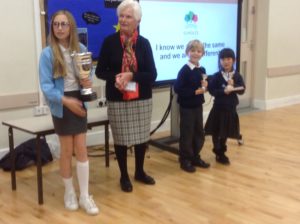
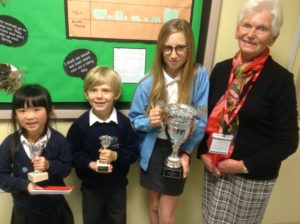
Anti-bullying week All Different, All Equal
Posted on 13 November 2017 by Miss Hague
The theme this year is All Different, All Equal with the following key aim:
The idea is to help children and young people celebrate what makes them, and others, unique and help them understand why it’s important that every child feels included in school, able to be themselves, without fear of bullying.
As part of their learning this week, children will discuss these aspects of bullying:
- Our definition of bullying
- Types of bullying – cyber-bullying and prejudice-based bullying related to gender, sexual orientation, race, religion and belief, special educational need and disability
- What to do if children experience or witness bullying. The key message is to tell someone.
STOP can stand for two key messages:
- the definition (Several Times On Purpose)
- the solution (Start Telling Other People)
All classes have access to worry boxes where they can tell an adult any concerns about bullying or any other issues.
For further support, bullying resources can be found at…
- https://www.anti-bullyingalliance.org.uk/tools-information/advice-parents
- https://www.kidscape.org.uk/resources/
- http://www.bullying.co.uk/advice-for-parents/
- https://www.internetmatters.org/hub/news-blogs/get-involved-in-anti-bullying-week-2017-all-different-all-equal/
- https://www.nspcc.org.uk/preventing-abuse/child-abuse-and-neglect/bullying-and-cyberbullying/keeping-children-safe/
- https://www.childline.org.uk/info-advice/bullying-abuse-safety/types-bullying/
- https://youngminds.org.uk/find-help/feelings-and-symptoms/bullying/
Yesterday, you 'watched us while we work'...
Posted on 09 November 2017 by Mr Roundtree
…thanks very much to you if you came along yesterday to the first of our ‘Watch us while we work’ sessions. This was a visit to school to get a flavour of what Reading, Writing and Maths teaching and learning is like in school, and hopefully to help you understand more about your child’s progress and how you can support at home.
Thanks for the feedback, too. Following the visits to classes, you had the opportunity to speak with Miss Hague about what you saw and to raise any questions and comments.
Here’s some of the feedback:
“Good to see children so engaged. Fast pace to the lesson. Supportive environment to encourage confidence. Very impressed with phonics.”
“Loved having an insight into the lessons and getting tips on how we can help and games we can do at home.”
“The fast pace of the lesson was good. Also, all children were engaged and knew expectations.”
“Really enjoyed seeing the Maths and times tables work, with the same numbers in 10s and 100s. Children were really keen to work.”
That’s great – thanks very much. Teachers will appreciate the comments.
We also appreciate constructive suggestions that will help you and your child. Here’s one that we’ll definitely act on:
It would be good to have “…a timetable to understand the daily life at school.” Agreed! We’ll publish a typical timetable for each class or phase on our website – sometimes times and subjects change, but we agree it would be useful for you to know a typical day to help you have a positive and reflective conversation with your child about the day they’ve had.
One parent thought it would be even better if they could have visited their own child’s class. There was an opportunity to do this at the recent Homework Review session. However, this can be very distracting for children, and affect the lessons – they would be much less typical of what goes on in school.
Again, thanks to all who came.
School Council
Posted on 07 November 2017 by Mrs Latham
The newly elected School Council have been given their badges by Miss Parling (School Council leader) and are proudly wearing them. They have also taken part in their first decision as elected members. They voted on the type of fundraising the school will do for Children in Need on 17 November. It will be a non-uniform day with a suggested donation of £1.
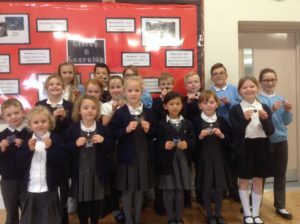
School Council and Democracy Week
Posted on 06 November 2017 by Mrs Latham
During Democracy Week (16-20 October 2017) pupils took part in the democratic process as they voted for their class representatives for School Council. Congratulations to the elected candidates and we hope they have a successful year representing the views of all the pupils in our school.
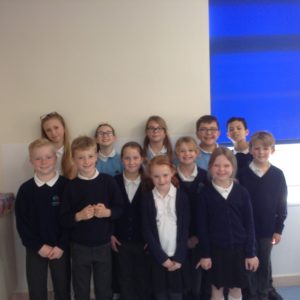
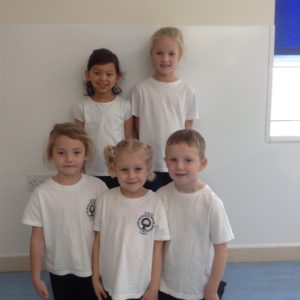
Follow-up inspection
Posted on 03 November 2017 by Mr Roundtree
Scholes (Elmet) Primary will be inspected, under section 8 of the Education Act 2005 (as amended), on 07 November 2017. This is a monitoring inspection – completely normal following the ‘Requires Improvement’ judgement earlier this year. The focus is around whether we are taking effective enough action to improve provision and outcomes; it will not result in a new inspection report or new judgement (although a follow-up letter will be published). Our inspection will be led by Nicholas Whittaker, HMI.
Identity
Posted on 02 November 2017 by Mr Roundtree
Our Living and Learning theme this half-term is Identity. Pupils will learn about their rights and responsibilities, what makes themselves and others special, valuing the similarities and differences between themselves and others and what is meant by community. This will be taught through our Living and Learning sessions and also two focused weeks – Anti-bullying week (13 November) and Who do you think you are? (20 November).
Our full Living and Learning long term plan is now available on the health pages and you can keep up to date with our weekly Living and Learning statements on the parent noticeboard in the playground and also on the school calendar.